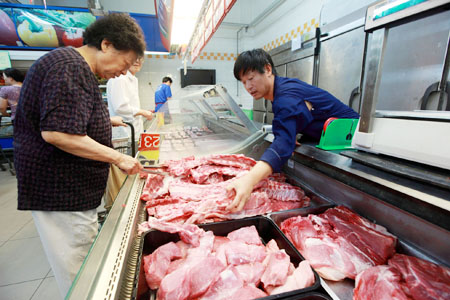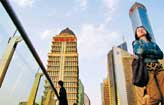Top News
Inflation nears peak: NDRC
Updated: 2011-07-23 08:57
By Wei Tian (China Daily)
|
 |
|
A customer buying pork at a supermarket in Beijing. Pork prices may plunge after spring next year if farmers boost pig inventories excessively because profits are currently high, the National Development and Reform Commission said. [Photo / China Daily] |
Commodity price reductions, more monetary control and less liquidity help
BEIJING - Inflation in China is reaching its peak and the situation in the second half of the year will improve, an official with the National Development and Reform Commission (NDRC) said.
"According to the lifecycle of price fluctuations, this round of price rises should be close to the inflection point ... and we're cautious as well as optimistic about the second half," said Zhou Wangjun, deputy director of the NDRC's pricing department, on the central government's website on Friday.
Premier Wen Jiabao has repeatedly said fighting price rises is a primary task. However, inflationary pressure is still considerable, according to the statistics. The consumer price index (CPI) rose 6.4 percent in June from a year earlier, marking a three-year high.
Zhou said prices are "under control"at present.
"Globally, commodity prices have fallen compared with April figures," he added.
Tightening monetary policy has also played a positive role. "Declining liquidity is key to stabilizing prices," Zhou said.
China has a secured domestic supply of important commodities at the moment. Summer grain production saw a 2.5 percent increase, while meat, poultry, eggs, vegetables and industrial consumer goods are all in adequate supply, Zhou said.
Past experience also suggested an end to price increases, Zhou said.
"The first two of the three rounds of price rises we experienced since 2000 - the first from 2003 to 2004, and the second from 2007 to 2008 - had a lifecycle of about 24 months," Zhou said. "And we're now in the 24th month of this round."
"Lastly, the 'carryover effect' which contributed 3.7 percentage points to the June CPI of 6.4, will drop 0.4 of a percentage point to 3.3 in July, and keep falling quickly in the following months," he said.
Zhou revealed that his department is now studying the feasibility of establishing a vegetable insurance system for basic varieties of vegetables to guarantee farmers' benefits and help stabilize vegetable prices by ensuring their supply.
"We are also creating a green channel for fresh produce, which will save 13 billion yuan ($2 billion) for vegetable transportation vehicles," he added.
Zhou forecast that pork prices may plunge after spring next year if farmers boost pig inventories "excessively" because profits are currently high.
The current increase in pork prices may stabilize or prices may rise "slightly" during the peak consumption period between the Mid-Autumn Festival in September and the Spring Festival in January, Zhou said.
Zhou's optimism is not shared by some economists.
Although commodity prices are falling, rebounding oil prices since the end of June and a possible third round of quantitative easing by the United States are still piling pressure on prices, said Zhang Shuguang, of the Unirule Institute of Economics (UIE).
"Domestically, even if pork prices do not rise, other foods will do, most likely edible oil," he said, explaining that the NDRC's price restriction order on edible oil expired in June, which may lead to a new round of price hikes.
"Curbing inflation will be a long term task for the Chinese government," the economist added.
UIE in its forecast put the CPI in the second half of the year at 5.6 percent, and the year-round figure at 5.2 percent.

Specials

Turning up the heat
Traditional Chinese medicine using moxa, or mugwort herb, is once again becoming fashionable

Ciao, Yao
Yao Ming announced his retirement from basketball, staging an emotional end to a glorious career.

Financial sector short of talent
Lack of skilled professionals in Shanghai inhibiting the city's development as a financial hub